Schlagwort: ‘Masters Thesis’
Writing my Master’s Thesis in Kraków
- Physics M.Sc.
- Poland, Kraków
- Uniwersytet Jagielloński
- 09/2024 – 06/2025
1. Application/Finding an internship
I became aware of the Erasmus+ internship because I wanted to return to the research group where I had already written my Bachelor’s thesis for my Master’s thesis. Unfortunately, it was not possible to write my Master’s thesis there. The group leader therefore suggested that I ask one of the cooperation groups in Lübeck or Krakow whether they could offer me an internship to write my thesis there. So that’s what I did.
I chose Krakow because I had already studied in Aachen for a few years and wanted to get to know another country. I had also wanted to learn a Slavic language for a long time, so Poland was an obvious choice.
The application process was quite straightforward overall, as I already had contacts in Krakow. The whole thing was quick and easy to organize, especially as the local group was happy to provide support. It was therefore not necessary for my university to help me find an internship; I was supported by my former research group.

©Phillippe Clement
2. Accomodation & Living expenses
During my stay in Krakow, I lived in an apartment that I looked for myself. However, it wasn’t easy to find an apartment, as most of the platforms are in Polish. If you only speak English, the choice is much more limited. So I was all the luckier: I found a well-located apartment that was in good condition. My landlord had also grown up in the USA and spoke fluent English, which made things a lot easier.
It is generally more difficult to find a suitable apartment in English. Many offers that are suitable for international students are either very outdated (e.g. apartments with a coal stove in the living room) or simply overpriced.
The cost of living in Krakow is generally lower than in Aachen. As far as food is concerned, I would say that the prices are roughly comparable to Germany. However, eating out is much cheaper and leisure activities are also usually affordable. Public transportation is well developed. However, there is no equivalent to the Deutschland-Ticket for students – instead you get a 51% discount on tickets.
3. Everyday life/ the internship
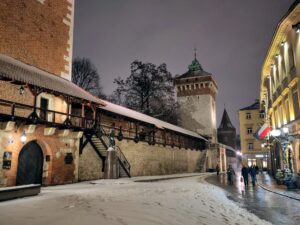
©Phillippe Clement
During the week, I went to university to work on my Master’s thesis. I also took some courses at the Jagiellonian University, which were not directly part of the Erasmus program, but were of great interest to me. The atmosphere at the university was very pleasant, open and collegial. There were only occasional minor problems in the administrative area, as not all staff speak fluent English. In such cases, I had to rely on the support of my supervisor, who helped me a lot.
In terms of content, I worked with neural networks as part of my Master’s thesis. Roughly speaking, the aim of the research group is to develop a detector that can be used in the field of proton therapy, a precise form of radiotherapy for cancer, in order to improve the accuracy of the treatment. In the process, I gained a lot of new knowledge, especially in the areas of machine learning, data structures and the application of ROOT, a widely used data analysis framework in physics.
The collaboration with my colleagues on site was relaxed and pleasant, which made the work much easier. The main language of communication in the lab and in the office was English, as Polish is quite a demanding language and I couldn’t speak much myself yet. Nevertheless, I took the opportunity to learn a little Polish to help me settle into everyday life.
4. Free time/tips
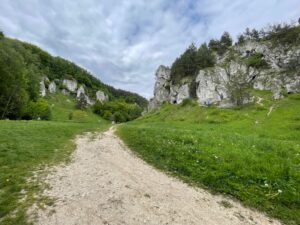
©Phillippe Clement
In my free time in Krakow, I had an incredible number of opportunities to be active and enjoy nature. Right next to the campus is a disused quarry with crystal-clear water, a popular place for swimming and relaxing. You can also climb the surrounding rock faces nearby. In general, the region around Krakow offers many opportunities for climbing, as the so-called “Polish Jura” stretches between Krakow and Częstochowa, a limestone mountain range with an impressive landscape.
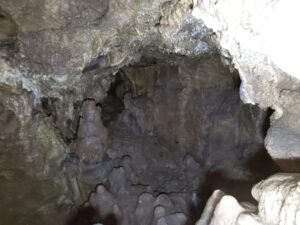
©Phillippe Clement
In addition to climbing, I also went on several hikes. I found it particularly exciting that there are officially designated places in Poland where you can camp in the countryside. This means you can go on longer hikes at the weekend and spend the night in the forest along the way. There are also a number of caves in the area to explore.
In terms of social life, I was very lucky to meet many international people, some of whom were Erasmus students, but also others who live or study in Krakow independently of the exchange program. As a result, I have built up a broad international network. The students at the university are mostly of Polish origin, but among the doctoral students there are many from South Asia, and I met some very nice people from India and Iran.
5. Conclusion
I take an incredible amount from my time in Krakow, both professionally and personally. On the one hand, I was able to work on exactly the research project I was interested in and gain valuable experience in the field of machine learning and detector physics. On the other hand, I started learning Polish and immersed myself in the culture.
I have not regretted the decision to go to Poland for a second, on the contrary: I am happier here than in any other place I have lived before. So much so that I have decided to stay in Krakow for a while after I graduate.
I can recommend an Erasmus+ internship without reservation, not only to learn something new professionally, but also to step out of your comfort zone, gain new perspectives and make international contacts. You learn a lot in a very short time when you suddenly move to another country with a different language where you hardly know anyone. Especially with regard to your own career, such a stay abroad can be enormously valuable, and this experience definitely looks good on your CV.
Writing my Master’s Thesis at the UCL
- Environmental Engineering M.Sc.
- United Kingdom, London
- University College London
- 09/2024 – 03/2025
Application
In January 2024, I applied to AVT (Aachener Verfahrenstechnik) at RWTH for an external master’s thesis at University College London (UCL). The AVT offers not only Erasmus places for process engineering students, but also external master’s theses at partner universities. I was particularly interested in topics related to fuel cells and water electrolysis, and looking through the partner universities I found out that I could combine research in this field with living in one of my favourite cities in Europe! After my successful application to AVT, I was put in contact with the exchange student coordinator at UCL’s Department of Chemical Engineering to find a topic and a supervisor. From UCL side, I had to apply as an undergraduate exchange student to be part of the official exchange student programme, even though I wouldn’t be taking any courses but would be working full-time in the labs. For this application I had to take an IELTS language test and submit a letter of recommendation, which was provided by the Erasmus team at AVT. After an online interview with one of the Associate Professors of the Electrochemical Innovation Lab (EIL), I decided on a preliminary topic for the thesis. Once these steps were completed, I was able to apply for my Erasmus+ internship grant and my UK visa.
Accomodation & Cost of Living

The view from my room in Camden ©Bia Brandt
As much as I love London, finding affordable accommodation can be challenging. UCL offers accommodation in the university’s halls to first year and exchange students. Accommodation in the halls is much more expensive than renting a room in Aachen, but still a good price for London. As I had already lived in London for an exchange semester during my undergraduate degree, I was not eligible for halls accommodation and spent my first two weeks in London looking for private accommodation. Especially in September a lot of people are on the lookout for a room as the university year is just starting. For my search I used Facebook groups and a website called Spareroom. Often rooms can only be rented on a yearly basis and for council tax reasons it is easiest for students to find accommodation in shared flats with other students. As well as finding rooms to rent, you can also use Spareroom to get in touch with other people who are looking for rooms. I went to a few flat viewings with a group of UCL students I had met through Spareroom. We didn’t end up renting together, but we remained friends for the rest of my time in London. The room I rented in the end was a six-month sublet in Camden and cost £950 a month. The area was great to live in (my favourite spot is Regents Canal) and I was spared many hot, stuffy and expensive tube rides as I could take the bus to UCL ☺️
Not only the rent, but the cost of living in general is a lot higher than in Aachen. Public transport is expensive, especially the tube if you use it regularly at peak times. Food in the UCL cantine costs ~£6 per meal (I always meal prepped as most of the students did). Also, there was a Lidl close to UCL where I usually did my shopping as the food is very reasonably priced there. There is an endless amount of things to do in a city like London. While eating out or going to the pubs will cost you a small fortune there are also things that can be done for free, as for example many of the museums. I can recommend the British museum which is just down the road from UCL, making it possible to visit the Rosetta stone during a lunch break.
Master’s Thesis in the EIL Labs

London at night ©Bia Brandt
On a day-to-day basis, I arrived at UCL around 9am and started working in the EIL labs. Mostly PhD students and research fellows work in the EIL labs and from the beginning I was part of the team and shared an office with the group. Compared to my previous research experience in AVT, I worked much more independently with different PhD students helping me where my research overlapped with theirs. I had a lot of freedom in where to go with my Master’s thesis, which was a very valuable experience, but also challenging at times. The labs and the work were sometimes a little less structured than I was used to in Aachen. However, everyone there was very helpful, especially in the first few weeks and when I was collecting my equipment, which was very valuable. Even though I was there for a Master’s thesis, I was treated like a PhD student, with bi-weekly meetings with one of the academic leaders of the group. I was not the only international visiting the EIL labs, there were two PhD students on a six-month visit for the same period as my Master’s thesis. Towards the end of my stay, another Masters student joined the EIL group for a research project. Overall, I felt very welcome in the group and even though I was the only one doing a Master’s thesis, it felt very easy to connect and spend time with the others both inside and outside of the labs.
Life at UCL & in London

Weekend walks along Regents Canal ©Bia Brandt
Needless to say, living in London is amazing! Over the course of my Master’s thesis I always took the weekends oft to enjoy the city. There is so much to do and even though I have spent 6 months doing all the touristy and not so touristy stuff, I still have things on my list. One of my favourite activities in London is to just walk around the streets or drive around in the red double decker busses as there is always something interesting to see.
Something I particularly enjoyed about studying at UCL is the societies. UCL has a very vibrant student community, and everyone can be part of it. When I went to the society fair at the beginning of my stay, I learned that there is a society for every hobby imaginable (ranging from a Taylor Swift Society to the Bubble Tea Society). I decided to join the Dance Society, the Hiking Society and the Photography Society (joining is very easy, you just need to pay ~£10 at the beginning of the semester to become a member). Joining the societies meant my calendar was full of social events from week one, but of course it took a bit longer to actually get to know the people in the societies. The society I enjoyed the most in the end was the Photography Society. How often do you get the chance to meet up with models (students from the modelling society) in a park in the middle of London and do a spring photo shoot as an amateur photographer?
Conclusion
The past six months have been incredibly intense, full of visits from old friends while making new friends. I had a steep learning curve academically through working more independently than I have before but also got the chance to dive into a more creative world through the societies and meet people who study something completely different from me. All of this in the setting of a huge and chaotic, yet also very beautiful city. Even though it took a lot of time to prepare and was an expensive time abroad, I am very glad I spent these six months in London ♡
Master Thesis in Finland in Winter – Is That Something for You?
- Product Development M.Sc.
- Finland, Oulu
- Oulun Yliopisto
- 11/2024 – 05/2025
Hello,
my name is Eileen, and I’d like to tell you a bit about my time here in Finland and hopefully inspire you to come and experience Finnish nature during wintertime.
I wanted to write my Master’s thesis in Oulu because my Finnish boyfriend lives and works there. I had already visited Oulu a few times during different seasons. Typically, the snowy season lasts from around November to May, but of course, this can vary quite a bit from year to year. Winters here are much darker and colder than in Germany, but I guess that doesn’t surprise anyone. It can get extremely cold – temperatures of -20°C are quite common in Oulu, since it’s only about 200 km south of the Arctic Circle. This means that in December, the sun barely rises at all, but on clear days, you can sometimes see a beautiful pink sky in the late afternoon.
I used to think I didn’t like winter, but winter in Oulu is very different compared to North Rhine-Westphalia. There are many fun winter activities like ice skating, skiing, and of course: sauna, which make this season really enjoyable. Most Finnish schools have ice rinks in winter that are free to use – you just need your own skates. Oulu also has many cross-country skiing trails that are maintained by the city. These are free to use and usually run through the forest. One side of the trail is prepared for classic skiing, and the rest can be used for skate skiing. I believe it’s also possible to rent skis, although I haven’t tried that yet. Another good option is to check out Finland’s version of eBay, called Tori, for used equipment. If you’re into downhill skiing, there are several ski centers a few hours away from Oulu that you can reach by car. Having a car in winter can be very useful. Finnish cars usually have studded winter tires, and parking spots often have outlets to plug in car heaters that warm up the engine before you drive. It is possible to bring your own car to Finland, but you should feel confident driving in winter conditions and make sure to get proper Finnish winter tires.
There are a lot of saunas in Finland, and it’s very likely that your apartment building will have a shared sauna that you can book. If not, going to a swimming hall is a good and affordable alternative – the sauna is usually included in the entrance fee. There are also river saunas where you can try ice swimming! If you’re more into indoor activities, Oulu also has climbing gyms and a trampoline hall. And of course, winter is the season to hunt for the Northern Lights, especially from November to March. They can be stunning, but you might have to wait a few weeks for clear skies. You can use a Northern Lights app to track when and where they might appear. Do not be disappointed, they always look brighter in pictures than in real life. Oulu also has an ice hockey team called Kärpät, and going to a game is definitely worth it! There are many beautiful national parks you can visit, such as the Little Bear’s Trail, which is lovely year-round but gets crowded on summer weekends because it’s the most popular trail in Finland. A bit closer to Oulu is Syöte National Park, which is easier to reach by car, though I think buses are available too. Many national parks have free huts where you can sleep, and you can check the maps on the Luontoon website. Depending on your route, it can be helpful to have snowshoes for winter hiking, or you can use skis if you have them.
Public transportation in Oulu is available, but the city also maintains its bike lanes year-round, so if you’re comfortable biking in the snow – as many Finns are – you can do that too. You can even get winter tires for your bike for better grip.
There aren’t many big cities near Oulu, but you can take a train north to Rovaniemi to visit Santa Claus. A few hours south by train is Tampere, a large city by Finnish standards. You can also visit the Ranua Zoo, which has many animals native to Finland.
Oulu itself has only a few sights in the city center, and half a day is enough to see them all (such as the policeman statue, the market hall, the main church, the free city museum, and the harbor). In winter, you can even walk on the frozen Baltic Sea, which connects some of the islands to the mainland. At the moment many sights are under construction, because Oulu is will be the European Capital of Culture of 2026.
Culture
The Finnish people I’ve met so far have been very open and friendly. While people in Nordic countries are often said to be more reserved – which is true to some extent – joining a sports club is a great way to meet locals. I joined the fencing club in Oulu, and they’ve been super friendly and welcoming, they also welcome beginners.
In general, people here are more relaxed than in Germany, and you usually thank the staff when leaving a store, which I really like. Because of the long dark winters, alcohol consumption is more strictly regulated than in Germany and also more expensive. Beer and low-alcohol drinks can be bought in supermarkets before 9 p.m., but for stronger alcohol, you have to go to a special store.
Language
No need to speak Finnish at all – English of course is enough here in Finland!
Living Costs and Organization
I sent my CV and a cover letter to the University of Oulu to find a thesis position in the mechanical engineering department. One of the professors then set up an online interview, and that was all I needed for the application process. After that, I searched for a supervising institute at RWTH, which was very easy and didn’t take much time.
Living in Finland is more expensive than in Germany, especially if you want to eat out. However, the University of Oulu pays you for writing your thesis there. In addition, you can apply for an Erasmus Traineeship Scholarship. You should apply for Erasmus at least six weeks before your internship starts.
The University of Oulu has a website for foreign workers that explains all the organizational steps you need to take – you can use this even if you’re writing your thesis for a company. However, it might not be possible to write your thesis for a company at all, depending on whether you can find a supervising institute at RWTH.
Flying or Taking the Train?
I usually fly to Finland, because taking the train is very time-consuming, just as expensive as flying, and quite exhausting. But if you have time, it could be a nice experience: you can go by train to Copenhagen from Hamburg, then on to Stockholm, and take a ferry to Finland (from Stockholm or Uppsala). This is a great way to avoid flying and see some cities on the way. There are also night trains you can take in Denmark or Sweden.
When I fly, I usually go to Helsinki, and from there, I either take the train (possibly a night train) or a domestic flight to Oulu. From Oulu airport, you can take a bus or taxi into the city. In winter, flying to Rovaniemi or Kittilä and taking the train from there to Oulu might also be a good option. You can check train schedules on the Finnish railway website [VR].
Final Thoughts
I would definitely recommend Finland as a destination for your Master’s thesis if you enjoy winter sports, hiking, and nature – and if you’re confident that you can make friends here, for example through sports clubs or among Erasmus students at the university. Otherwise, the long and dark winters might be difficult to enjoy.

©International Office
My experiences at Volvo Technology
- Energy Engineering M.Sc.
- Sweden, Göteborg
- Volvo Technology
- 10/2024 – 05/2025

Masthugget Church Viewpoint East ©Marc Müllenbach
Hello, my name is Marc. I am a German studying Master Energy Engineering at RWTH Aachen University, Germany, and participated in a research stay funded by the Erasmus+ Internship program during my master’s thesis at Volvo Technology – one of the most Swedish companies imaginable – in the second largest city Göteborg, Sweden. Getting this opportunity, to work on practical research in a company, was very difficult and almost did not work out. I started applying more than a year ahead, but this was way too early for most cases. In Sweden, there are no mandatory internships of up to 6 months; Swedish students gain practical experience during their summer break. Yes, you heard right: all students have a 2-3 month study-free period during the summer, without the need to prepare for exams, since they finish them before Midsommar (the summer solstice). Their internship culture comes from the fact that students do not receive their student funding during vacation, so many rely on summer jobs to survive financially until the next study period. Because internships are limited to these three months, companies don’t know about longer internships, especially not outside this period, as is common in Germany. Another aspect is that thesis work usually starts in January, as Swedish studies are separated into four periods, and are mainly carried out in groups of two—eliminating most chances if you want to start according to the German semester dates and alone. However, you would not be reading this if I hadn’t made it despite the low chances. I applied a lot, sent unsolicited applications to companies, connected with people on LinkedIn, and sent dozens of requests for an internship with the opportunity to follow up with a master’s thesis, which is usually the catch in Germany. The position was acquired via an unsolicited application to an industrial PhD student in cooperation between Chalmers University of Technology and Volvo Group, which led to the position at Volvo Technology. Other research internships would have been possible at Chalmers, but the research topic and work environment at Volvo were the best option.
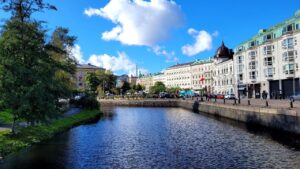
Moat of the old city fortifications, Bazarbron ©Marc Müllenbach
Finding a suitable accommodation without being registered as a Swedish student brings further problems, since you are not eligible for student accommodations. Some shared living opportunities always exist but are highly requested and not available in sufficient quantity. Some international students even live in hotels or cabins for the first year. In Swedish metropolitan areas, housing agencies require you to be in the queue for several years. Even colleagues at my workplace, who were in the queue for up to three years, were not able to find suitable accommodation (for their living standard) and ended up buying instead. I found mine with a lot of luck on Facebook (which is widely used in Scandinavia and also serves as an online marketplace and for international exchange). The accommodation had two rooms, one bedroom, and one living room/kitchen. The monthly costs were approximately €450 per person, with all additional costs included. I lived there with my girlfriend, who also studied at Göteborg University. For grocery shopping, I highly recommend using “Too Good To Go,” which offers a full bag of vegetables close to expiration for under €5—this saves money since vegetables and fruits are noticeably more expensive compared to Germany. Monthly expenses for groceries were roughly €200 per person, including all food and household costs and eating out every two weeks. Since the canteen at Chalmers was €6 (student) or €8 (visitor), and at Volvo Group €10, I decided to always prepare my own food, which is popular in Sweden. There are always spaces with microwaves and cutlery. For transportation, you can use rental bikes for €30 per year (Nextbike/Sty&Ställ). Since I needed to get to the other side of the harbor to Göteborg Lundby, I bought a tram ticket, which was €60 (student) or €75 (non-student) per month. Even though I was a student, I couldn’t use the student discount for many occasions, since in Sweden your student status is verified by a “Mecenat” app account issued by a Swedish university, which I did not have.
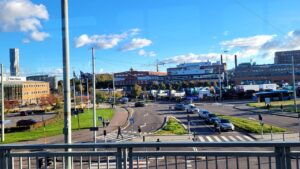
Volvo Group, Gropegårdsgatan 10 ©Marc Müllenbach
Everyday life during the research stay was a 40-hour workweek, starting at 9:00 and ending at 17:00. It is common to have a one-hour lunch break at 11:00, which I always spent with coworkers. Since I started in October, I was the only student at the company until January, when two other thesis workers joined, as is usual during this time. From Volvo, I received a laptop for my research work, which was mainly self-guided and supervised by weekly meetings with my supervisor. I highly enjoyed short coffee breaks with colleagues around 14:00-15:00, called “fika,” to discuss technical topics or daily life. There was one 30-minute fixed slot per week where the whole department met, and one colleague always brought sweet pastries or cake. The department worked great as a team, and I think this weekly contact, as well as spontaneous meetings on other days, helps with teambuilding. I also enjoyed that Volvo Group is an international environment, and you can get into contact with everyone on a casual basis since in Sweden you always call people by their first name; titles and positions do not mainly define your personality.

Vrångö Island ©Marc Müllenbach
During the winter, I came home from work when it was already dark, but there are many options available. Monthly sports membership at “Fysiken” cost €33 per month (3-month period) for students, including gym, courses, team play, and climbing/bouldering. I used to go every second day and made friends during climbing and basketball. It seems much easier to make international friends, as Swedish students usually already have their friend groups. Getting into those groups takes time and is comparable to making friends in Germany. With friends found that way, at the company or through international university programs such as ESN, you will definitely find people to spend time with—though more likely internationals who will leave after six months. However, Göteborg is a city where you can spend your time at many places, such as bars with after-work discounts and pub quizzes, museums, or at the ice hockey arena watching “Frölunda HC.” Around February, you will get home when it is still bright outside and can spend the sunset at famous places such as “Skansen Kronan.” On weekends, I recommend visiting the local historical
amusement park “Liseberg,” the islands in the archipelago near Gothenburg, one of the beaches, or hiking around lakes such as “Delsjön.” Trips around Sweden to Stockholm, Malmö, Helsingborg, or even Oslo in Norway are easy to do on a small budget. ESN also offered a one-week trip to Swedish Lapland, which everyone recommended to me, but I was quite
occupied by research work and also took vacation to visit my family over Christmas.
In conclusion, I liked Swedish culture before, and this trip increased its attraction. Sometimes it was tough to receive the same rights as locals, since you always need digital proof such as Swedish student status (“Mecenat”). For foreigners, it is also impossible to buy at a local food market or farm since “Swish,” the Swedish version of PayPal for payment, requires a Coordination Number for a Swedish ID, a Swedish bank account, and BankID. There are also several special days with traditions such as St. Lucia around Christmas, Valborg/Walpurgis Night and Swedish National Day in spring, and Midsommar in summer. However, my girlfriend and I decided to continue our time in Sweden and enjoy one or more summers at the coast and in nature, where Sweden has much to offer.
Writing my Master Thesis in Trondheim
- Chemistry M. Sc.
- Norway, Trondheim
- Norges Teknisk-Naturvitenskapelige Universitet
- 07/2024 – 01/2025

Figure 1: Cross-country skiing on Finsevatnet in Finse, mid-January. ©Julia Wang
Preparations
People often ask for the reason I chose Norway: Initially, I planned to do an internship in Sweden and then return to Germany for my thesis. Unfortunately, I lost contact to my Swedish prof, and as time was running out, I finished all required internships in Germany. However, I struggled to find a suitable thesis topic, so I decided to write it externally, including universities from countries in Ireland and Scandinavia in my search. I wanted to improve my English skills and also experience a place full of nature I have never been to before. As the nature in Ireland, Sweden, Norway, and Finland is beautiful, I ultimately found that Norway was the best fit for me. It offered a fascinating language but still with the comfort to speak English anytime, stunning landscapes, beautiful nature, a vibrant student city, and an exciting thesis topic.
I came across the topic of my thesis by proactively reaching out to professors working in areas I found particularly intriguing. As a chemistry student, I was often dissatisfied with the specializations at my university, so learning that Norway has a strong focus on environmental chemistry caught my attention. After a response from a professor, we had a brief meeting where he introduced me to a project based within the Arctic Circle, combining environmental chemistry with fundamental research. The process of signing the OLA was incredibly slow, but once that was finalized, there was nothing standing between me and my successful thesis – well, except for one thing: accommodation.
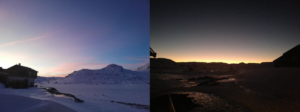
Figure 2: Stunning sunset in Finse, mid-January. ©Julia Wang
Accommodation & Living expenses
Overall, Norway is more expensive in nearly everything, which makes sense given their higher income. Usually, it is possible for exchange students to apply for student dorms (e.g. at Moholt). Those are particularly nice because of the large student communities that make it easy to meet new people. However, since I arrived in the winter semester – when most new local and exchange students come – the dorms were fully booked. As an internship student from Europe, I wasn’t automatically eligible for housing, so I had to request dorm accommodation. Even then, priority is typically given to international students from outside Europe and those attending summer courses at NTNU.
Thus, I ended up looking through the private housing market. Luckily, I found a room in a Norwegian student’s flatshare that was subletting for the exact duration of my stay. The flatshare with 4 people was comparably affordable and with 5300 NOK (everything included) even cheaper than the dorms. My place was located near Solsiden, which wasn’t exactly close to the university, but the area was well-connected by buses. It was also closer to the city center, as Tyholt and Moholt were about a 25-minute bus ride away. Personally, I preferred cycling since it is faster, cheaper, and the terrain was less steep compared to Gløshaugen-Moholt, which was a nice bonus.
As for the general living expenses, being a vegetarian made it a bit challenging to find affordable fresh vegetables, as everything tends to be more expensive and often heavily packaged in plastic. However, you get used to the prices after a while. As someone who loves tofu, I found it difficult to find good, firm Asian-style tofu. Common supermarket chains include Rema1000, Bunnpris, and Coop Mega for cheaper options, while Kiwi and Meny are more expensive. There are also online discounts and QR codes that offer discounts on specific products, and it’s helpful to ask around in ESN groups, as they often share these codes. I also found myself visiting Asian markets, like NM Market for the best deals on rice, soy sauce, and paneer at Melon Midtbyen. In general, products with higher fat, sugar, or imported goods were about twice as expensive as in Germany. However, Norwegians tend to offer larger packaging, which can help reduce the price per unit.
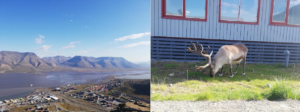
Figure 3: Parts of Longyearbyen and the Adventfjorden from the Varden viewpoint (left) and Svalbard reindeer in the middle of town (right). ©Julia Wang
Everyday life/the internship
Since I was doing my master thesis, my workload was higher compared to an average exchange student. I did miss out a bit on some activities since I was less flexible and had less free time. However, Norwegian work culture is much more chill and laid back than back in Germany. Nobody will ask you to come early and nobody cares if you leave early. Therefore, you need even more discipline to stay on track. Typical work hours in Norway are from 8am to 4pm. Afterwards, people head home for dinner. Many shops also close around 4 or 5 pm, so it’s a good idea to check their hours in advance to plan accordingly.
My thesis involved a field trip to Svalbard in mid-August, where I collected samples, spent time in the lab back In Trondheim, and then focused on writing the thesis. The working groups at NTNU are pretty small, so it is easy to get an overview but I rarely met everyone at once. Knowing how close people work together in working groups in Germany, sometimes I felt a bit lonely and disconnected from PhD or master students. However, I also enjoyed the independence I had to plan my own research, discuss it with my professor (who, by the way, dedicated a lot more time to me than the average professor in Germany would for a master’s student), and work closely with my supervisor. I also enjoyed the flexibility in how I structured my daily work and writing process.
In the evenings, I usually took part in various free-time activities including choir, anime screenings, board games, swimming, 3D printing, sewing, knitting, or baking. On weekends, I usually met up with friends, did my chores, or went on hikes and trips around the area. Sometimes, and further. With a bit of planning, you can easily bring your work with you, as many trains offer Wi-Fi! That way, you can explore places like Åndalsnes, Bergen, Finse (!!!), and more.
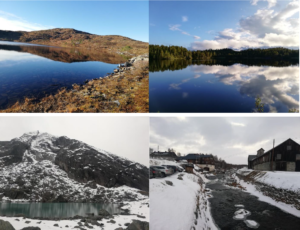
Figure 4: Stunning lakes and rivers found during hikes across Norway. Grytvatnet is found close to Vinjeøra, (upper left), Stordamvatnet is close to Lundamo (upper right), Hurrungsvatnet is near Åndalsnes (bottom left), and the Glomma river runs through Rørøs (bottom right). ©Julia Wang
Free time/tips
Trondheim is a big student city, so you will find all kinds of people. While connecting with international students was quite easy, since everyone is desperate to find friends, I was more interested stepping outside the Erasmus bubble and meeting Norwegians. And the stereotype holds true: While Norwegians are friendly and somehow open to start a conversation, there can still be a sense of distance. Personally, I’ve never been the most social or chatty person, so I always struggled to form deeper connections with anyone. That said, living with Norwegians and joining Norwegian clubs really helped me engage more with locals.
Norway is known for its stunning and beautiful nature (northern lights, midnight sun, mountains, fjords, lush green forests wherever you go!) and almost all Norwegians are big sports enthusiasts. NTNU has a student organization called NTNUI, where you can sign up for various sports clubs. Its very close to what American sports teams are like. People are competitive and passionate about their activities. If you want to try something typical Norwegian: You can join a group that teaches halling, a traditional Norwegian dance, or even take up sword fighting through another separate group.
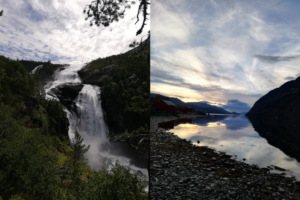
Figure 5: Because scenary with water is so beautiful: The stunning Nyastølfossen is found close to Kinsarvik on a 3-4 waterfall hike (left) and the beautiful sunset over Vinjefjorden can be observed in Vinjeøra (right). ©Julia Wang
If you are not into sports, there are still many student groups you can join: As for me, I joined a group called PVV for board games and anime. In general, they have a different focus but they also offer great social activities. I also joined a choir (NTNU motettkor), conducted by one of Norway’s most famous conductors and a group of Norwegian music students. The group was a fun mix of exchange students and locals, and the conductor was incredibly motivating, making it a truly enjoyable experience. Another popular hobby in Norway is knitting, with knitting events often hosted at cafés or yarn shops. It’s a relaxing activity, especially on those cold, rainy days. I also had the chance to learn 3D printing and practice sewing at the MakeNTNU workshop, where you can book time on a machine to create whatever you like (They are getting new printers, finally!!).
Another great place that offers cool events is the student building down the road from the technical university building: Studentersamfundet. It is definitely worth a visit, as they offer concerts, talk shows, discussions, I addition to having restaurants and more.
As for Trondheim, nature is incredibly accessible. You can enjoy small walks along the coast to the fjord in Lademoen, hikes in Estenstadmarka to the southeast, or head to Bymarka to the west. In winter, Bymarka is perfect for cross-country skiing. For bigger adventures, the ESN group organizes trips to Lofoten, Lapland, and other places. Otherwise, it is advisable to form small groups and rent a car to get around, especially in winter. While many people opt for Airbnbs, I highly recommend trying the great network of cabins in Norway! NTNUI Koiene have basic cabins around Trøndelag but personally, I suggest going for the DNT cabins as they are more spacious and comfortable.
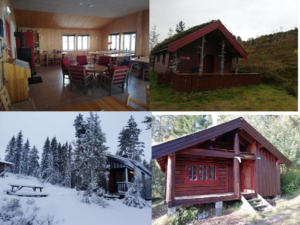
Figure 6: The common room in the DNT Brebua cabin in Finse (upper left), the DNT Venjedalsbu cabin close to Åndalsnes (upper right), a private cabin at Bymarka close to Ringvål (bottom left), and the Flåkoia NTNUI cabin near Lundamo (bottom right). ©Julia Wang
Conclusion
If you are an outdoor enthusiast who enjoys nature and want to experience a new culture during your internship or your thesis with excellent supervision and a nice work environment, I definitely recommend Norway. Not only did I gain insight into the country and its people, but I also embraced a new way of living my life while staying productive. There are plenty of opportunities and activities that allow you to connect with others. You just have to step out of your comfort zone and start engaging people!
I hope you enjoy your time here as much as I did if you choose Norway.
P.S. Yes, it does get pretty dark and depressing from November to February (Average daylight around 5h in Trondheim). But trust me, the experience alone is worth it. Plus, the midnight sun and longer days in summer make up for it!
Writing my Master Thesis in Trondheim
- Energy Engineering M. Sc.
- Norway, Trondheim
- Norges Teknisk-Naturvitenskapelige Universitet
- 01/2024-06/2024
Application / Finding an internship
To make new experiences and broaden my horizon I wanted to finish my academic studies with a stay abroad. So, I decided to do my master thesis in another country. I already had a research topic in mind and knew I wanted to go to another European country, thus I came across the NTNU in Trondheim, Norway – a place which seemed to be popular among engineering students from RWTH Aachen University. I did not apply for an advertised thesis, instead I had to demarcate the topic together with both my Norwegian supervisor and my German supervisor. Yet, the application process was surprisingly straightforward. I wrote an e-mail to the corresponding professor at NTNU, and he replied with a few hours and accepted my proposal. Additionally, I had to register myself as an exchange student at NTNU. The university’s international office was very supportive in that process. A benefit as an exchange student is that you are exempt from paying the semester fee.
Accommodation & living expenses
Since my stay in Trondheim was aligned with the Norwegian spring semester (January – June) I was given the chance to live in the Moholt student village (dorm). I can highly recommend Moholt to any exchange student because it makes your stay in Trondheim so much more enjoyable. First of all, the dorm rooms are very modern and well equipped. I lived in a 4-bedroom-apartment with three other students with shared kitchen and bathroom. The apartment had two big fridges, an oven with induction cooktop and a microwave – so well suited for cooking with friends. One big disadvantage is that the personal (bed)rooms are not equipped with a mattress. You either have to buy a new one (there is a furniture store right across the street) or get one from students who are leaving (there are Facebook and WhatsApp groups to organize buying and selling used stuff). Furthermore, there is a thing called Re:Store at Moholt where you can get used furniture and other household items for free which where donated by other students. In return, you can donate your used stuff when you leave. In case you need outdoor/hiking/sports equipment, you can go to the Bumerang store (also located at Moholt) where you can lend almost everything needed for outdoor activities (backpacks, skis, tents, …) without cost.
However, the best part of Moholt in my opinion is the Loftet. The Loftet is a common room located in the center of the village opened every day. It is equipped with tables where you can work as well as a lot of sofas where you can just relax. You can get a free cup of coffee or tea, pick one of a great variety of board games or play table tennis or video games on a PS5. The Loftet is run by very friendly volunteering students who work for Sit (the welfare organization for students) and can help you with almost anything. There are several recurring events, such as movie nights, quizzes, jam sessions, guided hiking tours etc. So, when you don’t know what to do – just go to the Loftet. The chances you’ll meet new interesting people and be involved in funny activities are quite high. It’s worth mentioning that the community at Moholt is very international.
Regarding the cost of living, the amount of money provided by the ERASMUS+ scholarship (750 €) was sufficient. The rent was approximately 400 euros (costs for internet and electricity are included). A six-months-ticket for the public transport costs about 250 euros. The food prices are extremely high compared to most other European countries. Especially basic groceries (water, milk, butter, cheese, vegetables) cost twice as much as in Germany. What’s also expensive is any close contact service, e.g. eating at a restaurant or going to the barber. Yet, if you are person who basically spends his or her money only (or mainly) on necessary things (groceries, toiletries, stationery, …) you will get along well with 750 € a month. If, on the other hand, you like to get take-away food often, go to clubs, bars, cinemas weekly, enjoy frequent shopping trips or have an expensive hobby, you might exceed the monthly stipend.
Everyday life / the internship
Paying bills in Norway works (almost) completely cashless. I have never held a Norwegian bank note in my hand, credit cards (or NFC-enabled smartphones) are accepted basically everywhere. Therefore, you should get a credit card that doesn’t charge fees for paying in foreign currency. Alternatively, you can link your PayPal account with Google Wallet. By doing that you also avoid those extra fees. Most Norwegians are fluent in English which makes communicating in everyday life very easy.
Since Trondheim is located quite northern on the globe the transition period from winter to summer is quite short. When I arrived in January the temperature was -13°C in the evening. There was a lot of snow until the beginning of April and the sun set very early (before 4:30 pm). Though from mid-April on there was a rapid change and in May temperatures sometimes went beyond 25°C and the sun did not set before 11 pm. So even when you finished working late, you could enjoy some hours of free time outside.
Working on my thesis was difficult in the first few weeks (and months to be honest). Since I had not applied for an advertised thesis a major, time-consuming part of my stay at NTNU was to formulate a research question which was relevant to both ‘sides’ (German and Norwegian). My Norwegian supervisor was actually the professor himself, who obviously has a tighter schedule than research assistants, which is why I did not meet him every week. The NTNU provides open offices at the campus particularly reserved for students. Unfortunately, the university cafeterias are extremely expensive (a meal costs 3-4 times as much as in Germany) which is why I worked from ‘home’ most of the time so that I was able to cook my own lunch.
Free time / tips
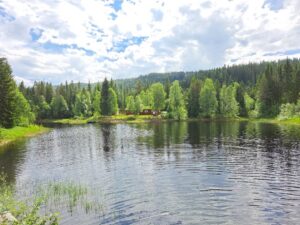
© Nils Baur
When you stay in Norway for a longer period, it is definitely worth experiencing the beautiful nature of the country. A great way to do that is going on a hike and staying overnight in one of the many cabins which NTNU owns. The cabins are neither equipped with electricity nor running water, to keep it warm you chop some wood and put it into the oven that is present in every cabin. Anything else – food, drinks, sleeping bags etc. – you must bring yourself. Although this may sound a little scary at the beginning, it really offers a cool and unique experience. Some cabins are located on a lake, some come with a sauna and above all you get a great view of the landscape.
From my experience, one might feel a little overwhelmed at first by all the opportunities to spend your free time. A good strategy is to start by joining the trips guided by the Sit students (starting at Loftet) to find out what kind of trip or activity suits you.
With the regard to writing a master thesis abroad, I’d recommend the following:
1) Align your stay in Norway with the semester cycle. That allows you to get a place in one of the student villages with all the benefits mentioned above.
2) If possible, find an advertised thesis with a (more or less) predefined research question. That will reduce the amount of required communication and coordination between your internal (your home university) and external (Norwegian) supervisor.
3) Draft a schedule for the different tasks of your thesis together with your supervisors. Think about what input you need from which supervisor (internal or external).
4) If you’re stuck at some point, don’t be afraid to ask your supervisor for help.
Conclusion
Trondheim is a great place to study. The people I have met there were extremely friendly without exception. The student welfare organization Sit provides a very comfortable living environment. It is important to take care of administrative stuff early enough (finding a topic and a supervisor, register as an exchange student, find housing, apply for ERASMUS funding, get adequate insurance). Yet, if you are facing problems during your stay there are many people and institutions who can help you. Personally, I would do some things differently in retrospect, nevertheless, I am very grateful for having made the experience.
Writing my masters thesis in Linz
- Simulation Sciences M.Sc
- Austria, Linz
- Institut für Verfahrenstechnik, JKU Linz
- 05/2022 – 09/2022
For my masters in Simulation Sciences with specialization in Fluid Process Engineering I searched for a masters thesis solely based on who did the most interesting topics. My attention fell on the habilitation thesis of a researcher in Linz who was actually quite happy to hear of my interest in his research – which made it quite easy to actually get the thesis. It should only be pointed out that for an external thesis usually an internal supervisor in the sending institution should be found first – a step I quite resolutely forgot. After I was luckily able to find an internal supervisor as well, accommodation in Linz was secured via WG-Gesucht, a portal to find flat-shares. Here it must be noted for later interns that a detailed and well written motivational text with your introduction, your advantages as flatshare-partner (many) and your expectations from your room-mates and flat-life (basics like “communicative” and “having a shared interest in keeping everything clean”) is key. If you mention something that fits only to their advertisement and no other, it is in all likelihood an additional big bonus.
After arriving in Austria and starting my internship, it was a positive surprise that not too many organizational hurdles had to be overcome, thanks to the unbureaucratic university and institute in Linz. Furthermore, I profited greatly from EU standardization, thanks to which my bank account and and SIM card worked fine. Future interns may find it useful to know that after shopping for groceries most supermarkets will hand out cash from your personal bank account when asked, so that the usual service fee at foreign ATMs can be completely avoided.
The actual work during my time in Linz itself was pretty independent. I’ve got my project and my supervisor was available for questions, if needed. The institute was very small such that everyone got to know everyone well and regularly had lunch together, which I kept in good memory. Otherwise it didn’t differ significantly from any student thesis back at my university. However, it should be noted that for an external thesis with internal supervision back at your home university regular meetings with your internal supervisors are recommendable in order to avoid confusion between your different supervisors. For me one meeting roughly every three weeks worked fine.
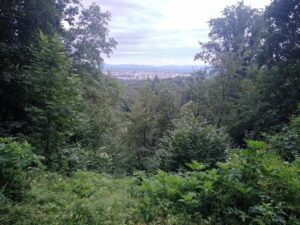
© Simon Stark
The most essential part next to work was of course to get to know Linz in special and Austria in general. As the cultural and linguistic ties between Austria and my home country Germany are relatively close, I halfway expected to avoid a culture shock once I adapted to the local dialect. But once the beer was sweet, the bread contained cumin and the sausages were actually better than in Germany, it definitely hit me. Next to the food side of things, the Austrian culture I’ve got to experience stood out by an avid “outdoors-culture” – which I thoroughly enjoyed – and the attitude to rather overspend on the good things on life than to end up with something bad – which I only got to enjoy once the Erasmus+ grant was approved.
Besides of things that appeared as distinctly Austrian to me, the city of Linz offers a pretty old town with a castle directly next to the Danube river and a rich cultural scene containing the Ars Electronica fair and two universities for arts. For parties on the other hand one didn’t even need to leave the university campus, as the students and faculties regularly organize faculty parties for their specific field of study or mensa-parties in the university canteen rooms for everyone. For me however, the most memorable activities were the hikes in the hills north of Linz, which is why I close this report with an image from there, with the city in the background.

